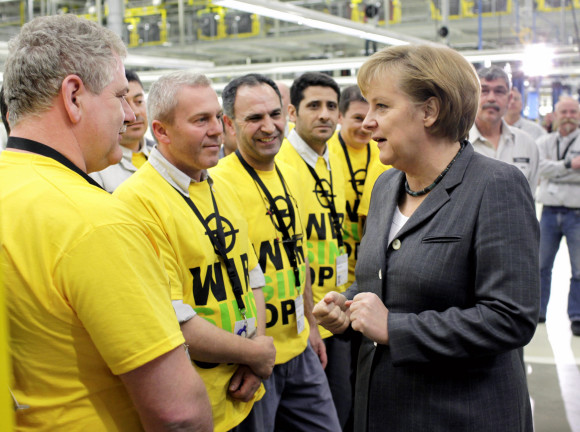
Germany Confused by Chance to Keep GM in, Russia Out of Opel
Publication: Eurasia Daily Monitor Volume: 6 Issue: 205
By:

General Motors had given its consent to the Opel sale with considerable reluctance, which could only grow in the face of demands for technology transfers to Russia as part of the sale. These and other differences did not allow the transaction to be finalized. Meanwhile, U.S. government assistance has put GM on the path to recovery; and GM has apparently decided to maintain its traditional position through Opel in the European car market. Thus, GM has moved to retain ownership of Opel.
Its potential benefits for Germany notwithstanding, GM’s decision has triggered emotionally adverse reactions at the German political and trade union levels. The German press describes Merkel’s and other politicians’ initial reactions as offended and indignant about GM’s reversal. Prior to the recent elections the German government had supported the Russian “rescue” of Opel across party lines, despite strong criticism in the mainstream press over the onerous terms of the deal.
Meanwhile, Germany’s parliamentary elections resulted in the replacement of Russia-friendly Social-Democrats by the neoliberal Free-Democrats in the governing coalition, alongside Merkel’s Christian-Democrats. The government’s Russia policy is now firmly in Merkel’s hands. Merkel’s evolving position on the Opel issue will provide the first significant test of her Russia policy after the elections.
Straight off the return flight from Washington, Merkel descended on Opel’s flagship plant at Ruesselsheim near Frankfurt on November 4, meeting with the Works Council in front of television cameras. She seems to adhere to the Russian (“Magna”) solution for now. Federal ministers of both parties, as well as the governments of federal states with Opel plants on their territories, sound infuriated by the loss of the Russian “solution.” Some stalwart conservative Christian-Democrats as well as trade union leaders participate in the chorus of protests (Frankfurter Allgemeine Zeitung, Financial Times Deutschland, Sueddeutsche Zeitung, Handelsblatt, November 5, 6).
Opel’s insolvency threatens some 25,000 jobs at four Opel plants in four different German federal states. More than 10,000 Opel employees staged protest demonstrations and work stoppages on November 5 against GM’s decision, following calls from the Works Council and I.G. Metall trade union. Christian-Democrat politicians attended and addressed the televised protests at factory gates. The union leaders and work force had felt comfortable all along with the German government-subsidized Russian “rescue.” Some trade union leaders had met with Putin in Russia to help arrange the Opel sale, as Putin himself disclosed (Handelsblatt, September 14).
The German government wants GM to repay, before the end of this month, nearly 1 billion Euros that has already been disbursed to Opel as a bridging loan. That sum is part of the government-approved 1.5 billion Euros “bridging loan,” pending the completion of Opel’s sale as negotiated with the Russians and Magna (and apart from the 4.6 billion Euros credit guarantee pledge). The German government also wants GM to submit a restructuring concept for Opel, with the focus on retaining work places and continuing technological modernization.
For their part, work force representatives say that they would reject any “additional sacrifices” beyond those already agreed. The work force has already given up wage raises, Christmas bonuses, and paid vacation time until 2011. But some of these terms are conditional on the Russian (“Magna”) solution; and trade union leaders threaten to revoke some of the concessions, if GM retains ownership of Opel. The Works Council warns that it “would not cooperate with devising a return to General Motors” (Reuters, November 5).
This initial nervousness may well subside in Germany as negotiations get under way with GM. The problems in U.S.-German relations, however, are wider and deeper.
The Opel controversy helps to highlight an overall German-U.S. dissonance that both sides are failing to address at the political level. The soaring rhetoric of Chancellor Angela Merkel’s November 3 address to the joint session of the U.S. Congress (www.faz.net, November 3) only served, unwittingly, to camouflage those mutual misunderstandings.
Literally the next day, that soaring address was followed by a hard landing in Germany. Politicians from left to right –including vocal figures from Merkel’s party– protested against a possible American solution for Opel, defending a Russian solution, of which the German press itself is uniformly critical. For the first time in memory, German mainstream trade union leaders resorted to anti-American overtones in their arguments.
Meanwhile, the Russo-German “strategic partnership,” generating asymmetric German dependencies on Russia (EDM, June 4, July 24, August 18, September 14), does not form a subject of trans-Atlantic debate. U.S. outreach and information policy seems as inadequate in Germany as elsewhere. In the German body politic, many perceive the United States as an unpredictable partner that poses demands and problems, while Russia is seen in political and business circles as a source of grand and beneficial solutions. The Opel affair is only one news-generating aspect of a growing, structural dissonance in U.S.-German relations.




